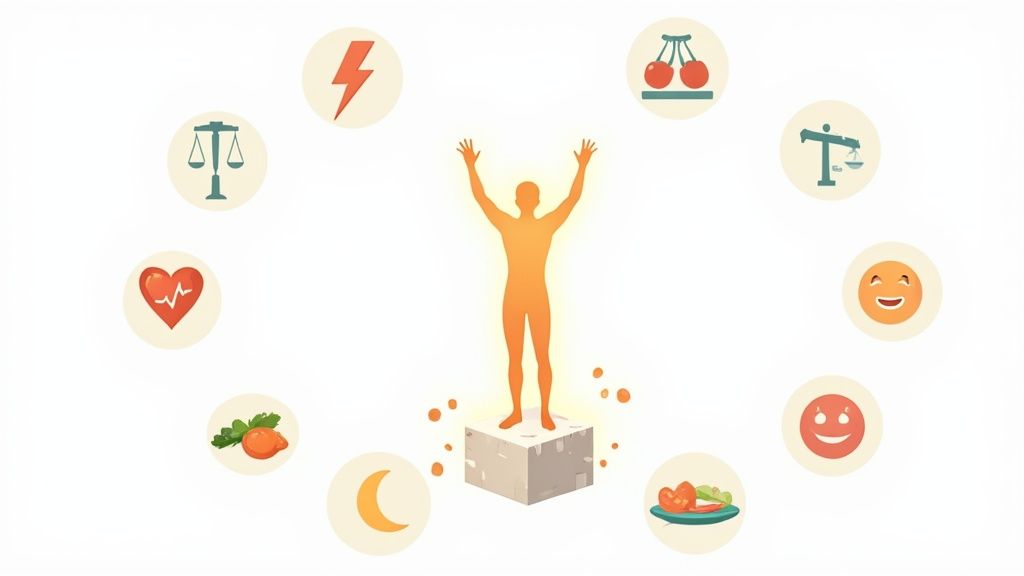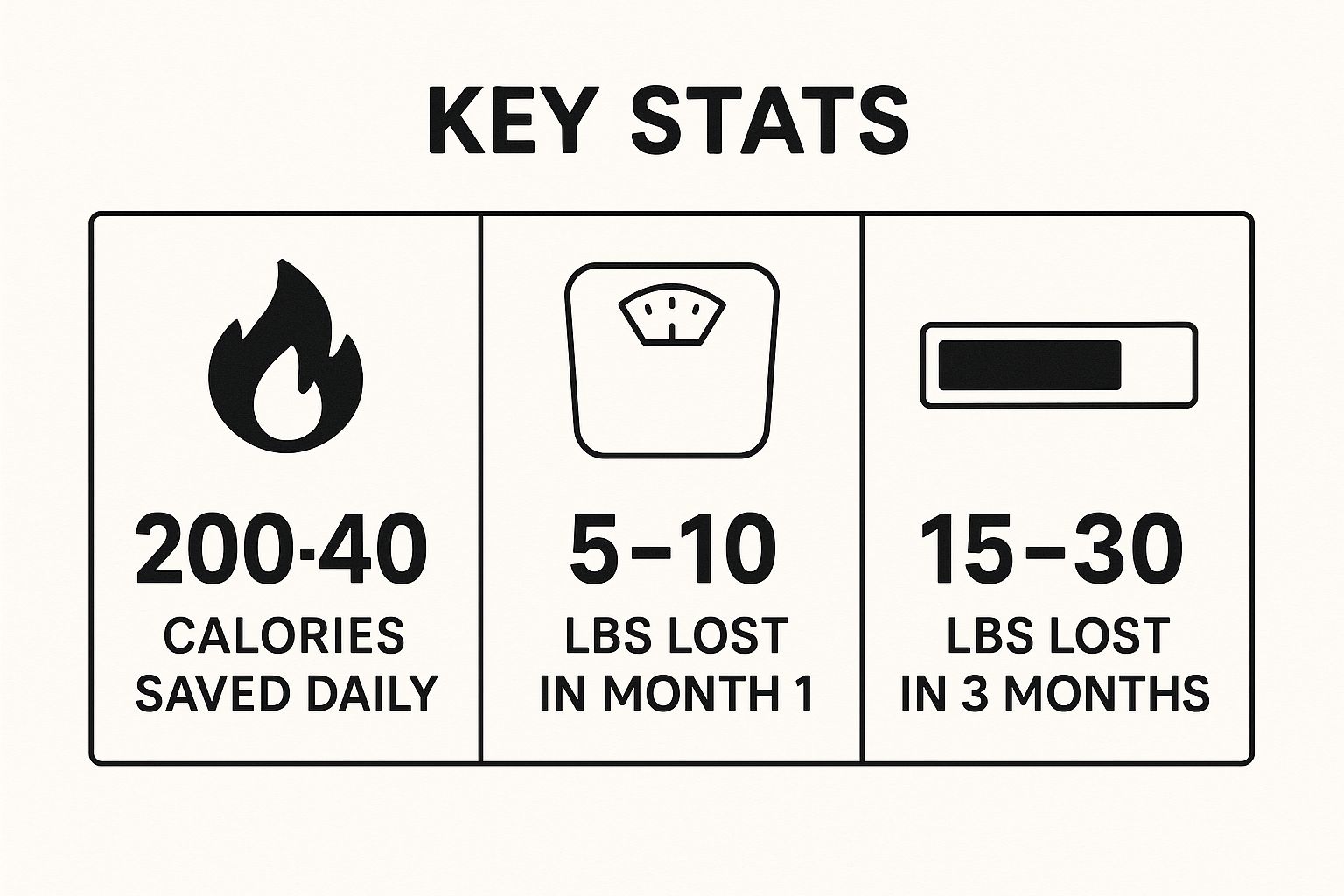8 Giving Up Sugar Benefits That Will Transform Your Life

Sugar is everywhere. It’s in our coffee, our 'healthy' snacks, and even our savory meals. While a little sweetness can be a treat, constant consumption of added sugars can silently sabotage our health, leading to weight gain, energy crashes, and a host of chronic issues.
You've likely heard whispers of the incredible changes that happen when you break free, and you're curious about the real giving up sugar benefits. It’s more than just a diet trend; it's a fundamental shift that can reset your body, clear your mind, and unlock a new level of well-being. This article isn't about restriction; it's about liberation.
We’ll explore eight transformative benefits of removing added sugar from your diet. We will provide the science-backed details, practical steps, and real-world examples you need to start your journey. Get ready to discover how this one simple change can have a profound impact on everything from your energy levels and skin health to your long-term risk of chronic disease. We will cover the following key areas:
- Weight Loss and Management
- Improved Energy Levels and Stability
- Better Skin Health and Anti-Aging
- Enhanced Mental Clarity and Cognitive Function
- Reduced Risk of Type 2 Diabetes
- Improved Heart Health
- Better Dental Health
- Stronger Immune System Function
1. Weight Loss and Management
One of the most immediate and tangible giving up sugar benefits is noticeable weight loss. This happens because added sugars are a major source of "empty calories." They provide a quick burst of energy but offer virtually no nutritional value, like vitamins, minerals, or fiber, that helps you feel full and satisfied.
When you consume sugar, your body releases insulin to manage the resulting spike in blood glucose. Chronic high insulin levels signal your body to store excess energy as fat, particularly around the midsection. By eliminating added sugars, you reduce your daily calorie intake and help stabilize insulin levels, which encourages your body to start burning stored fat for fuel instead of storing new fat.
How It Translates to Real Results
Many people are surprised by how quickly the pounds come off once they cut out sugar. This isn't just about cutting out obvious culprits like soda and candy; it's also about eliminating the hidden sugars in foods like bread, sauces, and low-fat yogurt.
The infographic below highlights typical results seen when people commit to a low-sugar lifestyle, showing just how impactful this single change can be.

These numbers show a clear and motivating progression, from daily calorie savings to significant weight loss over several months.
Putting It Into Practice
To start seeing these benefits, focus on whole foods that naturally keep you full. Prioritize lean proteins, healthy fats, and high-fiber vegetables.
- Read Labels: Become a detective and scan nutrition labels for hidden sugars in processed foods.
- Swap Your Sips: Replace sugary drinks like juice, soda, and sweetened coffees with water, herbal tea, or seltzer.
- Boost Protein: Ensure every meal contains a good source of protein to help manage hunger and prevent cravings.
For a deeper dive into how sugar impacts your metabolism and weight, Dr. Robert Lustig provides a comprehensive explanation.
2. Improved Energy Levels and Stability
One of the most profound giving up sugar benefits is escaping the constant energy roller coaster. That familiar cycle of a quick sugar-fueled high followed by a debilitating crash happens because simple sugars cause rapid spikes and drops in blood glucose. When you remove them, your body can finally maintain steady, reliable energy levels throughout the day.

Without a constant supply of glucose, your body improves its metabolic flexibility. This means it becomes more efficient at switching fuel sources, learning to burn stored fat for a more sustained and stable energy supply. This transition, championed by experts like Dr. David Perlmutter, ends your reliance on sugar for fuel and eliminates the need for that 3 p.m. candy bar to stay awake.
How It Translates to Real Results
This shift from erratic energy spikes to consistent stamina has a massive impact on daily life. You no longer have to plan your day around potential energy slumps.
Many people report a significant reduction in afternoon fatigue, with some office workers noting they feel up to 40% more productive after lunch. Athletes often experience enhanced endurance, while parents find they have more energy for family activities in the evenings instead of feeling drained.
Putting It Into Practice
To achieve stable energy, focus on building meals that provide slow-releasing fuel. This approach helps keep your blood sugar balanced and prevents the highs and lows associated with sugar intake.
- Eat Protein with Every Meal: Protein slows the absorption of carbohydrates, promoting stable blood sugar and energy levels.
- Include Healthy Fats: Sources like avocado, nuts, and olive oil provide long-lasting energy that keeps you feeling full and energized for hours.
- Stay Hydrated: Dehydration is a common cause of fatigue. Drinking plenty of water is essential for optimal energy metabolism.
For a deeper look into boosting your vitality, explore our guide on how to increase energy levels naturally. Learn more about how to increase your energy levels on stopsugar.app.
3. Better Skin Health and Anti-Aging
A surprising yet powerful benefit of giving up sugar is a visible improvement in your skin's health and appearance. Sugar intake directly contributes to a process called glycation, where excess sugar molecules in your bloodstream attach to proteins like collagen and elastin. These proteins are responsible for keeping your skin firm and flexible, but glycation damages them, leading to reduced elasticity, premature wrinkles, and sagging.

Furthermore, high sugar consumption triggers inflammation throughout the body, which can manifest as acne, redness, and puffiness in the skin. By cutting out sugar, you reduce this inflammatory response and protect your skin’s structural proteins. This helps maintain a clearer, smoother, and more youthful complexion, making it one of the most rewarding giving up sugar benefits.
How It Translates to Real Results
The connection between diet and skin is well-documented. Dermatological studies have shown significant reductions in acne severity when participants adopt a low-glycemic diet. It's also a well-known secret in the beauty and entertainment industries, with models and actors like Miranda Kerr often eliminating sugar before photo shoots or big events to ensure their skin is clear and glowing.
The visual evidence is often compelling. Before-and-after photos from individuals who have committed to a sugar-free lifestyle frequently show a dramatic improvement in skin tone, texture, and a reduction in blemishes. This happens because your body can finally focus on repair rather than constantly fighting inflammation.
Putting It Into Practice
To leverage this benefit, focus on nourishing your skin from the inside out while supporting its natural healing processes.
- Boost Antioxidants: Eat more antioxidant-rich foods like berries, leafy greens, and nuts to combat oxidative stress and protect skin cells.
- Stay Hydrated: Drinking plenty of water is crucial for skin health, helping to flush out toxins and support healthy cell turnover.
- Support Collagen: Incorporate foods rich in vitamin C (like citrus fruits and bell peppers) and amino acids (from lean protein) to help your body naturally produce more collagen.
For more on the science behind diet and skin aging, the work of dermatologist Dr. Nicholas Perricone offers in-depth insights into how specific foods impact inflammation and skin health.
4. Enhanced Mental Clarity and Cognitive Function
Beyond physical health, one of the most profound giving up sugar benefits is a significant boost in mental acuity. The notorious "brain fog" that many experience is often directly linked to sugar consumption, which causes rapid blood sugar fluctuations and inflammation in the brain. These spikes and crashes disrupt the brain's steady energy supply, leading to poor concentration and a feeling of mental sluggishness.
When you remove added sugar, you provide your brain with a stable energy source. This stabilization helps reduce neuroinflammation and supports healthier neurotransmitter function, which is critical for mood, focus, and memory. The result is a sharper, clearer mind capable of sustained concentration and quicker thinking.
How It Translates to Real Results
The cognitive improvements from a low-sugar diet are well-documented. Neurologists like Dr. David Perlmutter and psychiatrist Dr. Daniel Amen have long highlighted the connection between sugar and brain health. Many people report transformative results, from business executives who credit sugar elimination for better strategic thinking to students who see dramatic improvements in their academic performance after making this change.
Research has also demonstrated that individuals often score better on cognitive tests after just 30 days of being sugar-free, showcasing how quickly the brain can benefit from this dietary adjustment.
Putting It Into Practice
To unlock enhanced mental clarity, focus on nourishing your brain while you transition away from sugar. This ensures your brain gets the support it needs to function at its best.
- Boost Brain-Healthy Fats: Incorporate sources of omega-3 fatty acids, like salmon, walnuts, and flaxseeds, to support cognitive function.
- Eat Brain-Boosting Foods: Add foods like blueberries, turmeric, and dark leafy greens to your diet to fight inflammation and support brain health.
- Manage Stress: The transition period can be stressful, so practice mindfulness or meditation to support your mental state.
- Maintain Stable Meal Times: Eat regular, balanced meals to keep your blood glucose and energy levels steady throughout the day.
For a more detailed look at how sugar impacts your cognitive performance, you can explore the connection between sugar and brain fog.
5. Reduced Risk of Type 2 Diabetes
A powerful benefit of giving up sugar is a significantly reduced risk of developing type 2 diabetes. Excessive sugar consumption, particularly from sugary drinks and processed foods, forces your pancreas to work overtime producing insulin. Over time, your body's cells can become less responsive to insulin, a condition known as insulin resistance, which is the primary precursor to type 2 diabetes.

By removing added sugars, you give your pancreas a much-needed break and allow your body to regain insulin sensitivity. This helps maintain stable blood glucose levels, preventing the chronic high blood sugar that damages organs and defines the disease. This single dietary change directly supports your long-term metabolic health.
How It Translates to Real Results
Scientific studies and clinical programs have demonstrated dramatic results. For instance, the landmark Finnish Diabetes Prevention Study showed that lifestyle changes, including reduced sugar intake, lowered diabetes risk by a staggering 58% in at-risk individuals.
Many people with prediabetes have successfully normalized their blood sugar levels within months of adopting a low-sugar diet. Even those already diagnosed with type 2 diabetes have, under medical guidance, been able to reduce or eliminate their medication needs by cutting out sugar.
Putting It Into Practice
Taking control of your metabolic health starts with conscious food choices that stabilize blood sugar.
- Focus on Fiber: Prioritize fiber-rich vegetables, legumes, and whole grains. Fiber slows down sugar absorption and helps you feel full.
- Work with a Professional: If you are at risk or have prediabetes, consult with a healthcare provider to monitor your progress and make informed decisions.
- Spice It Up: Incorporate spices like cinnamon, which has been shown to help improve insulin sensitivity.
- Explore Safe Swaps: If you need a touch of sweetness, consider options that don't spike blood sugar. You can learn more about sugar alternatives for diabetics to make smart choices.
6. Improved Heart Health
Beyond its impact on your waistline, one of the most critical giving up sugar benefits is a significant boost to your cardiovascular health. A diet high in added sugar contributes directly to several major risk factors for heart disease, including chronic inflammation, elevated triglycerides, and high blood pressure.
When you consume excessive sugar, it can lead to higher levels of unhealthy fats, like triglycerides, in your bloodstream. It also causes inflammation throughout the body, including in your arteries. By cutting out sugar, you directly address these issues, reducing the strain on your heart and circulatory system. This proactive step helps protect one of your body's most vital organs from long-term damage.
How It Translates to Real Results
The connection between sugar reduction and a healthier heart is well-documented. Studies by the American Heart Association have shown that individuals who limit their sugar intake can lower their risk of dying from heart disease by over 20%.
Many people who quit sugar also report impressive drops in their lipid panels. It's not uncommon to see triglyceride levels fall by 30-50% within a few months. Furthermore, noticeable improvements in blood pressure can often be measured in as little as eight weeks, showcasing how quickly your body can respond to this positive change.
Putting It Into Practice
To leverage this benefit, focus on a heart-smart, low-sugar lifestyle that actively supports your cardiovascular system. This goes beyond just avoiding sweets and includes embracing nourishing foods and habits.
- Choose Healthy Fats: Incorporate heart-healthy fats like those found in olive oil, avocados, and nuts to help manage cholesterol.
- Eat Potassium-Rich Foods: Add foods like bananas, spinach, and sweet potatoes to your diet, as potassium helps counterbalance sodium and lower blood pressure.
- Get Moving: Combine your dietary changes with regular cardiovascular exercise, such as brisk walking or cycling, to strengthen your heart muscle.
Pioneering cardiologists like Dr. Caldwell Esselstyn and Dr. William Davis have long advocated for this approach, detailing how a whole-food diet free of added sugars can dramatically improve heart health outcomes.
7. Better Dental Health
One of the most well-documented giving up sugar benefits is a significant improvement in oral health. Sugar is the primary fuel source for harmful bacteria in your mouth, such as Streptococcus mutans. When these bacteria consume sugar, they produce acid as a byproduct, which erodes tooth enamel and leads to cavities.
By eliminating added sugars, you effectively starve these acid-producing bacteria. This reduces the overall acidity in your mouth, creating an environment that protects your teeth from decay. This simple change helps prevent new cavities from forming and can even halt the progression of early-stage decay, leading to fewer fillings and better dental checkups.
How It Translates to Real Results
The positive impact on dental health is often noticeable within a few months. Holistic dental practitioners and pediatric dentists have long advocated for low-sugar diets, observing firsthand the dramatic reduction in tooth decay. For instance, studies have shown that children on sugar-free diets can experience up to 70% fewer cavities.
Adults also report significant improvements, with dental hygienists often commenting on cleaner teeth and healthier, less inflamed gums during routine cleanings. Removing sugar reduces plaque buildup and lowers the risk of gingivitis and more serious periodontal disease.
Putting It Into Practice
Protecting your smile from sugar damage involves more than just brushing and flossing. A dietary approach is crucial for long-term success.
- Rinse After Fruit: Even natural sugars in fruit can feed bacteria. Rinse your mouth with water after eating fruit to wash away residual sugars.
- Choose Xylitol Gum: If you chew gum, opt for sugar-free versions containing xylitol. Xylitol is a sugar alcohol that oral bacteria cannot metabolize, which helps inhibit their growth.
- Maintain Oral Hygiene: Continue your routine of brushing twice a day with fluoride toothpaste and flossing daily. Cutting sugar enhances these habits; it does not replace them.
- Schedule Regular Checkups: Visit your dentist regularly to monitor your progress and address any issues early.
The American Dental Association provides extensive resources on how diet impacts oral health, reinforcing the connection between sugar consumption and dental decay.
8. Stronger Immune System Function
A lesser-known but powerful giving up sugar benefit is the reinforcement of your immune system. Excess sugar consumption contributes to chronic low-grade inflammation, which keeps your immune system constantly on high alert and less effective at targeting real threats. It also directly impairs the function of white blood cells, the very soldiers that fight off bacteria and viruses.
When you remove added sugars, you reduce this inflammatory burden and allow your immune cells to function optimally. This frees up your body's natural defense mechanisms to more effectively identify and neutralize pathogens. A robust immune system means you're better equipped to handle seasonal illnesses and recover more quickly when you do get sick.
How It Translates to Real Results
The impact of a sugar-free diet on immunity can be profound. Many people report a noticeable decrease in the frequency and severity of common illnesses like colds and the flu.
For instance, some studies have shown up to a 40% reduction in cold frequency for individuals on low-sugar diets. Beyond general wellness, integrative oncology centers often note that cancer patients who eliminate sugar report better tolerance to treatments, and functional medicine doctors see autoimmune patients experience fewer and less intense flare-ups.
Putting It Into Practice
To bolster your newly strengthened immune system, focus on providing it with the right nutrients and supportive habits. This will maximize the benefits of cutting out sugar.
- Boost Key Nutrients: Prioritize foods rich in vitamin C (like bell peppers and broccoli) and zinc (like seeds and legumes) to support immune cell production.
- Include Probiotic Foods: Incorporate fermented foods like yogurt, kimchi, or kefir into your diet. To further empower your body's defenses, it's beneficial to understand the crucial link between probiotics and immunity, as gut health plays a significant role in overall immune strength.
- Manage Stress and Sleep: High stress and poor sleep both suppress immune function. Practice mindfulness, get regular exercise, and aim for 7-9 hours of quality sleep per night to keep your defenses strong.
8 Benefits of Giving Up Sugar Comparison
| Benefit | Implementation Complexity 🔄 | Resource Requirements ⚡ | Expected Outcomes 📊 | Ideal Use Cases 💡 | Key Advantages ⭐ |
|---|---|---|---|---|---|
| Weight Loss and Management | Moderate - requires label reading and social adjustments | Moderate - focus on whole foods, natural alternatives | Significant weight loss (5-30 lbs over 1-3 months), improved body composition | Individuals aiming for weight loss and metabolic health | Rapid results, reduced cravings, sustainable long-term benefits |
| Improved Energy Levels and Stability | Moderate - transition period of 2-4 weeks | Low - dietary adjustments with protein and fats | Steady energy without crashes, better mental clarity | Those experiencing energy fluctuations or fatigue | Enhanced productivity, better exercise performance |
| Better Skin Health and Anti-Aging | Low to Moderate - consistency over weeks needed | Low - focus on antioxidant-rich foods and hydration | Clearer skin, reduced acne, slower aging visible in 4-8 weeks | People targeting skin improvements and anti-aging | Visible skin improvements, reduced inflammation |
| Enhanced Mental Clarity and Cognitive Function | Moderate - initial withdrawal symptoms possible | Moderate - requires brain-healthy diet and stress management | Improved focus, memory, reduced brain fog within weeks | Students, professionals, anyone needing sharper cognition | Better work performance, reduced anxiety and mood swings |
| Reduced Risk of Type 2 Diabetes | High - requires consistent lifestyle commitment | Moderate to High - ongoing monitoring and healthcare support | Dramatic risk reduction, possible prediabetes reversal | Individuals with insulin resistance or prediabetes | Significant diabetes risk reduction, improved metabolic markers |
| Improved Heart Health | Moderate - requires comprehensive lifestyle changes | Moderate - diet and exercise | Lower blood pressure, triglycerides, reduced inflammation | At-risk cardiovascular patients | Significant heart disease risk reduction |
| Better Dental Health | Low - focus on sugar elimination and oral hygiene | Low - dental hygiene products, sugar-free alternatives | Fewer cavities, healthier gums over 6+ months | All ages seeking dental health improvements | Reduced cavities and dental costs, fresher breath |
| Stronger Immune System Function | Moderate - initial transition period | Moderate - nutrient support and lifestyle | Fewer infections, faster recovery, better autoimmune management | Those prone to infections or chronic inflammation | Enhanced immune response, reduced inflammation |
Your Next Step to a Sugar-Free Life
The journey we've explored together reveals a powerful truth: the giving up sugar benefits are not just about health metrics, they are about reclaiming your life. From achieving sustainable weight loss and experiencing consistent, crash-free energy to nurturing clearer skin and a sharper mind, the rewards are profound. Reducing your sugar intake is one of the most impactful decisions you can make for your long-term vitality, significantly lowering your risk of chronic conditions like type 2 diabetes and heart disease.
However, knowledge alone doesn't create change. The transition from understanding these benefits to experiencing them requires a practical, sustainable plan. It’s about making small, consistent choices every single day that build into a powerful new lifestyle. This is where your commitment truly takes root.
Your Action Plan for a Sweeter, Sugar-Free Future
Embarking on this path can feel daunting, but breaking it down into manageable steps makes it achievable. The key isn't perfection; it's progress. Here’s how you can start today:
- Begin with a Sugar Audit: For one week, simply observe and note where sugar appears in your diet without judgment. Check labels on sauces, dressings, yogurts, and drinks. This awareness is your foundational first step. You might be shocked to find sugar lurking in savory foods you never suspected.
- Focus on Swaps, Not Subtraction: Instead of thinking about what you’re “giving up,” focus on what you’re adding. Swap your sugary breakfast cereal for a protein-rich omelet. Exchange your afternoon soda for a sparkling water with a squeeze of lime. This positive framing helps prevent feelings of deprivation and makes the process more enjoyable.
- Embrace Whole Foods: Center your meals around whole, unprocessed foods like vegetables, lean proteins, healthy fats, and fruits. These foods are naturally low in added sugar and rich in the nutrients your body needs to thrive, helping to stabilize blood sugar and crush cravings at their source.
Navigating Cravings and Finding Joyful Alternatives
Cravings will happen, and that’s perfectly normal. The secret is to have a strategy in place. When a craving for something sweet strikes, ask yourself: Am I hungry, thirsty, or just bored? Try drinking a large glass of water first. If the craving persists, have a healthy, pre-planned snack ready, like a handful of almonds or an apple with peanut butter.
Remember, a sugar-free life doesn't mean a treat-free life. It's about finding healthier ways to indulge. As you transition, discovering delicious alternatives like a sugar-free Basque Burnt Cheesecake can help satisfy your sweet cravings without compromising your goals. Finding these joyful swaps makes the lifestyle sustainable and prevents you from feeling like you're missing out.
Ultimately, choosing to reduce sugar is an act of profound self-care. You are investing in a future where you feel more vibrant, think more clearly, and live more fully. Every meal is an opportunity to nourish your body and reinforce your commitment. Embrace the process, celebrate your small victories, and get ready to welcome the incredible version of yourself that is waiting on the other side of sugar.